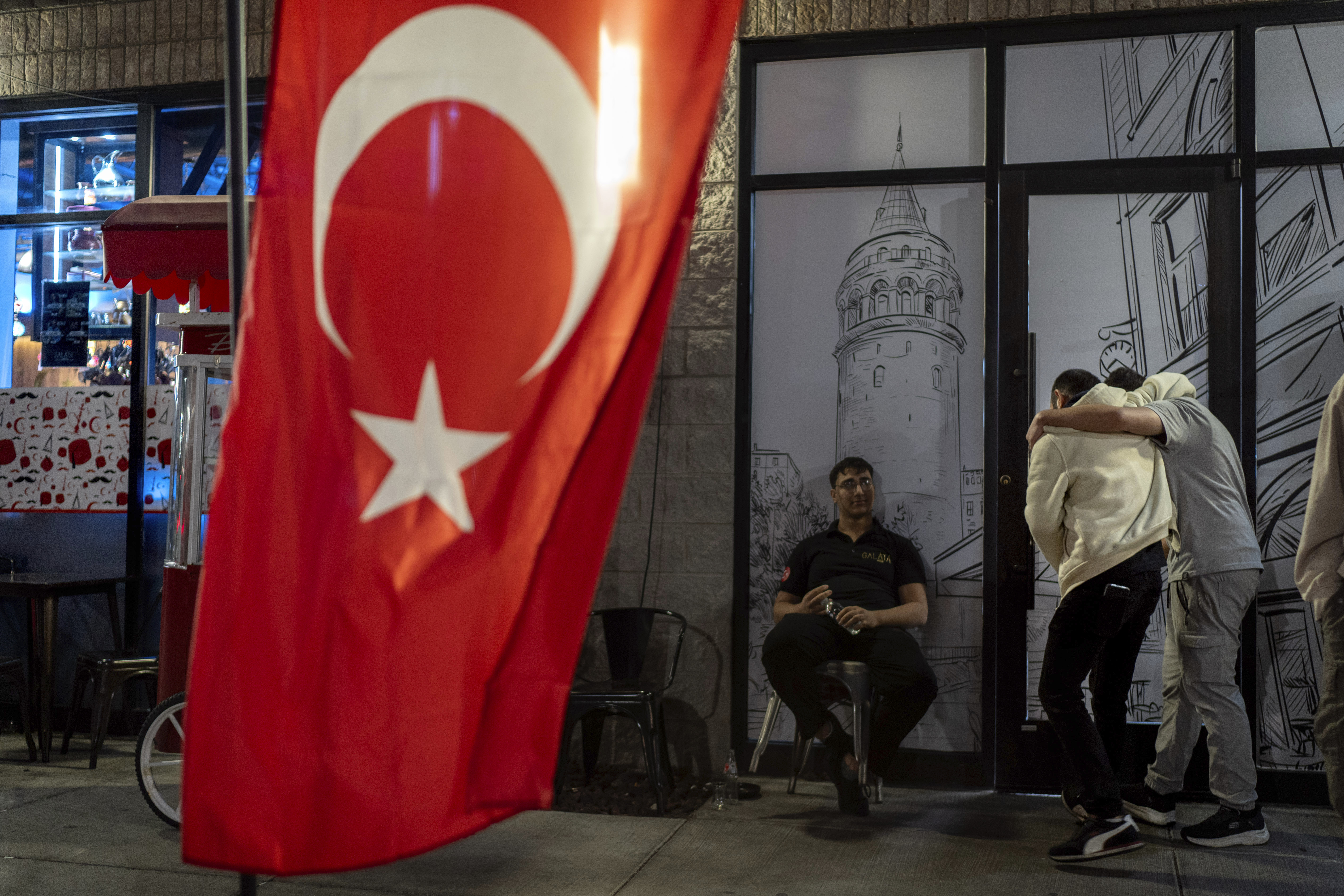Politics
Dearborn’s Arab Americans feel vindicated by Harris’ loss
DEARBORN, Michigan — Arab American leaders for months warned Vice President Kamala Harris that she needed to separate herself from President Joe Biden’s support of Israel in the war in Gaza — or face an electoral backlash from this influential community in a key battleground.
But those pleas went largely ignored.
Instead, Harris made strategic errors that deeply insulted Arab American voters reeling from intense grief as the death toll in the Middle East climbed. She refused to host a Palestinian American onstage at the Democratic National Convention. She curtly shut down protesters at campaign rallies who criticized her solidarity with Biden over the conflict. She dispatched pro-Israel surrogates to Michigan.
Now, many Arab American residents in Dearborn “feel like they’ve been redeemed,” said Michael Sareini, Dearborn city council president. “They wanted to send a message and they did.”
“This stance on endless wars and killing of innocent women and children has got to end,” he said.
In the initial days after the election, as Democrats despaired over the results, Dearborn residents felt unsurprised by President-elect Donald Trump’s resounding win, according to interviews with nearly a dozen Arab American leaders in this densely populated Muslim city just outside Detroit. Adding to their sense that they were right, their protest vote was not limited solely to Arab Americans, who make up a fraction of the U.S. population. Their furor toward the Biden administration over Gaza spilled out onto college campuses across the nation and among progressives of all ages, amounting to the most significant anti-war protest in a generation.
“While we dealt with that grief, we became much more politically mature,” said Amer Zahr, a Palestinian American activist.
Unofficial results show Trump received the most votes in Dearborn, with 42 percent, while Harris earned 36 percent — a 33 percentage point drop from when Biden won Dearborn in 2020. Green party candidate Jill Stein collected 18 percent.

Zoom into Arab American neighborhoods and you’ll find an even more dramatic crumbling for the vice president. Trump showed up big throughout the Eastern and Southern parts of Dearborn, where a high concentration of the community lives. In one of those precincts, Harris earned only 13 percent while Trump got 51 percent.
Multiple Dearborn leaders said that Trump’s social conservatism and isolationist “America First” foreign policy made Arabs more comfortable with backing a Republican after the community fled from the GOP in the aftermath of 9/11. And, for a population that often feels targeted by the justice system, many identified with Trump’s legal woes.
But those leaders emphasized that the dramatic move toward Trump does not mark a permanent realignment with the Republican party for this demographic historically part of the Democratic base but rather an explicit rejection of Biden and Harris. The top of the ticket was the exception: Democrats won Dearborn at every other level of the ballot, from U.S. Rep. Rashida Talib down to state lawmakers and school board members.
“They didn’t vote for Trump because they believe Trump is the best candidate,” said Osama Siblani, publisher of the Arab American News. “No, they voted for Trump because they want to punish the Democrats and Harris.”
‘I am speaking now’
When Harris took Biden’s place as the Democratic nominee in July, Arab Americans were hopeful. She had given some indications of a softer stance in the Middle East, and Dearborn residents were optimistic that she may be the president who would stand up against Israel. By that point, the war in Gaza had endured for nine months — and Biden repeatedly refused to order an arms embargo against Israel, despite pleas from the community for an end to the bombardment that according to Gaza health officials has killed more than 40,000 Palestinians.
But when Palestinian Americans were denied a speaking slot at the DNC convention a few weeks later, residents in Dearborn started to feel disgruntled. That resentment grew when Harris in August told a pro-Palestinan protester “I am speaking now” — a line that Arab Americans now point to as a difficult moment for Harris to overcome.
As the deaths increased in the Middle East — and images of dead bodies were shared widely on social media — the Arab community felt even more pushed aside by the Biden administration. It started to feel, they said, like a betrayal from Harris herself.
When Israel launched a ground invasion into Lebanon in October, which they stated was in response to military attacks by Hezbollah, Arab Americans’ rage over the response by the U.S. reached its peak.
Opposition to Harris “built up slowly but surely,” as the war continued on, said Abed Hammoud, founder of the Arab American Political Action Committee. A large share of Dearborn’s population comes from South Lebanon, which has been devastated by the military action. Some Michigan residents have seen their entire families overseas killed.
“I wake up in the morning, I turn on the news just to see which village was leveled to the ground and who was killed,” said Sam Baydoun, Wayne County commissioner, who emigrated to America from Lebanon when he was 15. “This is the daily routine we have here in Michigan.”

In the final weeks of the campaign, the Harris campaign dispatched surrogates to Michigan who deeply offended the Arab community. Bill Clinton, speaking at a rally in late October, said Israelis were in the Holy Land “first.” Residents also grumbled about appearances by New York Rep. Richie Torres, a staunch Israel proponent.
Adding to insult, the campaign touted the endorsement of former Vice President Dick Cheney, the mastermind behind the war in Iraq. His daughter, Liz Cheney, who was the former No. 3 Republican in the House and a staunch Trump critic, was featured as part of Harris’ closing message.
By that point, Harris’ repeated statements that she wanted to end the war in Gaza and return hostages felt hollow to this community. She had lost them.
An opening for Trump
The Trump campaign viewed the Arab community’s disdain toward Harris in the waning weeks before the election as an opportunity. Residents were inundated with anti-Harris texts and mailers, which “played big” among voters, said Ali Jawad, founder of the Lebanese American Heritage Club.
Then Trump paid a visit to Dearborn four days before the election. He stood in a restaurant surrounded by a crowd of Arab Americans and declared that under his presidency, “we’re going to have peace in the Middle East — but not with the clowns that you have running the U.S. right now.”
Harris never personally visited Dearborn. Campaign staff and surrogates went in her place instead.
“The Democrats did this,” Zahr said. “They created a situation where Donald Trump was walking around our city, putting his feet up, shaking hands, kissing babies and Harris didn’t even enter our community. She was afraid.”
Arabs in Dearborn were united in anguish but deeply divided on how to express it politically. Factions emerged. Conversations among themselves grew tense. The main PAC representing Arab American interests not only declined to make a presidential endorsement but urged residents not to vote for Harris or Trump. Some residents decided to skip voting in the presidential race entirely.
There was a split among the area’s mayors. Dearborn Mayor Abdullah Hammoud emerged as a strong ally of the uncommitted movement, the Michigan-born coalition that galvanized antiwar sentiment on college campuses. Election results revealed that some big liberal college counties seemed to underperform for the Democratic ticket by at least a point.

Hammoud refused to meet with Trump when he was in Dearborn, based on his disagreement with the former president’s enactment of the Muslim ban and arming of Saudi Arabia. But he also declined to endorse Harris.
The mayors in two neighboring cities with similarly large Arab populations, Dearborn Heights and Hamtramck, stumped for Trump throughout Michigan. Dearborn Heights Mayor Bill Bazzi even appeared at Trump’s final campaign rally held in Grand Rapids in the hours before Election Day.
But Trump’s record — like the Muslim ban and his promises to deport millions of immigrants — was enough for some to push aside their misgivings for Harris, like for political organizer Ismael Ahmed, who said he “held my nose and voted for her.”
Yet in the end, Trump “was able to say some things that made them think maybe he’s really on our side,” Ahmed said. “Or maybe he’ll fix the economy in a way that no one else will. And it worked.”
Politics
Republicans are freaking out about Hispanic voters after a Texas upset
Republicans are in full-out panic mode over their plunging support with Hispanic voters after losing a special election in a ruby-red Texas district over the weekend.
On Saturday, a Democrat posted a 14-point victory in a Fort Worth-based state senate district President Donald Trump had won by 17 points in 2024, a staggering swing that was powered by significant shifts across the district’s Hispanic areas.
It’s the clearest sign yet that the GOP’s newfound coalition that propelled Trump’s return to the White House may be short-lived. Many Republicans are warning the party needs to change course on immigration, focus on bread-and-butter economic issues and start pouring money into competitive races — or risk getting stomped in November.
Polling already showed that Republicans were rapidly losing support from Hispanic voters. But the electoral results were a confirmation of that drop.
“It should be an eye-opener to all of us that we all need to pick up the pace,” U.S. Rep. Tony Gonzales, a Republican from a majority-Hispanic district in South Texas, said in an interview. “The candidate has to do their part, the party has to do their part. And then those of us in the arena, we have to do our part to help them as well.”
Sen. Ted Cruz (R-Texas) told reporters Tuesday that the election was a “very concerning outcome.” Texas Lt. Gov. Dan Patrick posted on X that the results should be a “wake-up call for Republicans across Texas. Our voters cannot take anything for granted.” Florida Gov. Ron DeSantis said “a swing of this magnitude is not something that can be dismissed.”
Taylor Rehmet, the Democrat who flipped the state Senate seat over the weekend, made huge gains with Hispanic voters amid national pushback to the Trump administration’s aggressive immigration enforcement tactics and widespread economic frustration across demographic groups.
Ahead of the election, Texas Gov. Greg Abbott — an immigration hardliner who bused migrants to Democratic-led cities during the Biden administration — said the White House needed to “recalibrate” on its immigration crackdowns following the shooting of Alex Pretti by an immigration officer in Minneapolis.
“That imagery coming out of Minnesota in the last few days has had a huge impact on not only Hispanic voters, but swing voters, independents in Texas and around the country,” said Texas GOP consultant Brendan Steinhauser. “What’s transpired there has definitely led to a bit of a political backlash.”
As Republicans panic, Democrats are feeling a renewed jolt of optimism after they swept statewide races last year in Virginia and New Jersey. They believe they found a winning formula with Rehmet, whose working-class biography as a union leader, Air Force veteran and Lockheed Martin machinist resonated with voters, along with his narrow focus on local issues like maintaining public school funding.
Tory Gavito, president of Democratic donor network Way to Win, said she received excited texts from several major donors over the weekend after the win. “Knowing it’s a wave year, this just adds a little bit of more wind in our sails,” she said. “It’s not just a question around Texas, it’s a question around Texas and Mississippi and Alabama and what does this mean for lots of places.”
Texas Republicans have the most to worry about of any in their party about a major Hispanic snapback towards Democrats.
Hispanics are now the largest ethnic group in Texas, making up 40 percent of the population. Trump carried Latinos in the state in 2024, exit polls showed, a massive swing from earlier elections, and Republicans had been making especially strong gains with rural, more conservative Hispanic voters in the Rio Grande Valley. But as Texas Democrats look to win a U.S. Senate election for the first time since 1988, they’re eyeing an opportunity to pull those voters back in.
“They are leaving in droves and going in the opposite direction,” said Javier Palomarez, president and CEO of the U.S. Hispanic Business Council. “This is a warning sign.”
And Texas Republicans also banked on retaining at least some of their newfound Hispanic support when they redrew their Congressional map last year, creating several majority-Hispanic districts that Trump would have carried by double digits last year. That includes rejiggering district lines for two top GOP targets, Democratic Reps. Henry Cuellar and Vicente Gonzalez, as well as a third district outside San Antonio.
“They’ve banged three of these five new Republican seats on a demographic that Democrats were never able to turn out for 30-40 years, ” said GOP consultant and Trump critic Mike Madrid, referring to young, Hispanic male voters. But now, Trump’s hardline immigration policies have “angered and upset them.”
Samuel Benson and Alex Gangitano contributed to this report.
Politics
Pirro appears to walk back threats to arrest gun owners in DC
D.C. U.S. Attorney Jeanine Pirro appeared to walk back a previous threat to arrest anyone who brings a gun to Washington amid an uproar from Second Amendment groups.
The backtrack came after Pirro’s initial comments sparked fierce criticism from GOP members of Congress and gun rights advocates. It’s the latest in a series of statements from the administration that have rankled many in the party’s pro-Second Amendment base.
“I don’t care if you have a license in another district, and I don’t care if you’re a law-abiding gun owner somewhere else — you bring a gun into this district, count on going to jail, and hope you get the gun back” Pirro said during a Monday appearance on Fox News, where she previously hosted the show “Justice with Judge Jeanine.”
But less than 24 hours later, Pirro attempted to reframe her earlier comments, writing in a social media post that she is “a proud supporter of the Second Amendment.”
“Washington, D.C. law requires handguns be licensed in the District with the Metropolitan Police Department to be carried into our community,” she wrote in a Tuesday morning post on X. “We are focused on individuals who are unlawfully carrying guns and will continue building on that momentum to keep our communities safe.”
She also referenced the response in a video posted to her social media page, acknowledging that “some people are concerned about something I said yesterday” before further clarifying her position.
The conservative National Association for Gun Rights swiftly came out in opposition to Pirro’s stance, calling her remarks “unacceptable and intolerable comments by a sitting US attorney.”
Kentucky Rep. Thomas Massie, one of the administration’s most frequent critics in the House GOP Conference, also denounced Pirro, writing on social media: “Why is a ‘conservative’ judge threatening to arrest gun owners?” Reps. Greg Steube (R-Fla.), Chip Roy (R-Texas) and Andrew Clyde (R-Ga.) criticized the U.S. attorney, too, and Florida Gov. Ron DeSantis said “Second Amendment rights are not extinguished just because an American visits DC.”
Washington does not recognize concealed carry permits from other states, and local law requires all firearms in the district to be registered with local police.
John Commerford, executive director of the National Rifle Association’s legislative arm, said Pirro’s remarks “highlight the need for Congress to pass H.R. 38, the National Concealed Carry Reciprocity Act.” That bill, introduced last year by Rep. Richard Hudson (R-N.C.), would allow anyone with a state-issued concealed carry license to carry a firearm in any other state.
“Law-abiding citizens’ right to self-defense should not end simply because they crossed a state line or entered Washington, D.C.,” Commerford said in a statement to Blue Light News.
The backlash to Pirro’s comments comes as the Trump administration faces uproar from Second Amendment advocates for its rhetoric following the killing of U.S. citizen Alex Pretti by federal immigration enforcement officers in Minneapolis.
Just days after the fatal shooting, President Donald Trump criticized Pretti for carrying a firearm, saying: “I don’t like that he had a gun.”
Other members of the administration also disparaged Pretti, with White House press secretary Karoline Leavitt contending that carrying a weapon raises “the assumption of risk” during interactions with law enforcement and FBI Director Kash Patel saying “you cannot bring a firearm loaded with multiple magazines to any sort of protest that you want.”
Those remarks triggered fury from Second Amendment groups like the NRA, which called federal prosecutor Bill Essayli’s response to the shooting “dangerous and wrong.” The rhetoric has also fueled concern that the administration could be harming the GOP’s chances of defending its slim majority in Congress in this fall’s midterm elections.
Politics
DHS watchdog investigating use of force by ICE
The Department of Homeland Security’s inspector general is investigating use of force by ICE agents, according to a letter sent to the watchdog by congressional Democrats.
The probe comes as the Trump administration faces intense scrutiny over its nationwide immigration crackdown, which has at times turned violent in recent weeks, sparking concern from a bipartisan group of lawmakers.
The letter, sent Monday to DHS Inspector General Joseph Cuffari, cites the fatal shootings of U.S. citizens Renee Good and Alex Pretti by federal agents in Minneapolis last month. The letter says the inspector general launched a review on Jan. 8 of the tactics undertaken by ICE and Customs and Border Protection, urging the watchdog to speed up the timeline of the probe.
“Given the urgency of this situation — with communities facing severe, and sometimes fatal, harm from ICE’s tactics on American streets every day — we request that your office conduct this review expeditiously and share any preliminary findings with Congress and the public on an expedited basis,” the Democrats wrote, according to a copy of the letter reviewed by Blue Light News.
Democratic Massachusetts Sens. Elizabeth Warren and Ed Markey — who led the letter along with Reps. Ayanna Pressley (D-Mass.), Dan Goldman (D-N.Y.) and Lou Correa (D-Calif.) — first requested the probe in June.
Thirty-six of their colleagues across the House and Senate signed on to the letter, which was first reported by The New York Times.
The inspector general’s office is conducting an “audit of ICE’s Processes for Investigating and Addressing Allegations of Excessive Use of Force,” per the office’s list of ongoing projects.
The probe seeks to “determine whether ICE investigates allegations of excessive use of force and holds personnel accountable in accordance with applicable Federal laws, DHS policies, and ICE directives.”
Spokespeople for the inspector general’s office and Immigration and Customs Enforcement did not immediately respond to requests for comment on the probe.
The lawmakers asked the watchdog to prioritize its review in light of the fact that the office routinely misses its own goal of completing audits within 397 days, according to a January report from the Government Accountability Office.
The Trump administration has signaled a willingness to soften its approach to immigration enforcement in recent weeks, with Democrats threatening to impeach DHS Secretary Kristi Noem and withhold funding for the department over its aggressive tactics.
In a move seen widely as an attempt to tamp down tensions in Minnesota, the White House pulled Border Patrol commander Gregory Bovino from the state and dispatched border czar Tom Homan to Minneapolis last week.
Following meetings between Homan and Democratic leaders in the state, Noem announced on Monday that ICE and CBP officers in the city will begin wearing body cameras during immigration enforcement operations there — a key demand from congressional Democrats in their push for reforms of the agencies.
And White House deputy chief of staff Stephen Miller — a central figure in the administration’s immigration enforcement campaign — conceded that CBP agents may not have been following protocol during the fatal shooting of Pretti, which is under review by the Justice Department’s Civil Rights Division and DHS.
Still, President Donald Trump has aimed to downplay the shift in strategy, rebuffing suggestions that his administration is retreating from its aggressive deportation operation last week and continuing to disparage Pretti.
-

 The Dictatorship12 months ago
The Dictatorship12 months agoLuigi Mangione acknowledges public support in first official statement since arrest
-

 The Dictatorship5 months ago
The Dictatorship5 months agoMike Johnson sums up the GOP’s arrogant position on military occupation with two words
-

 Politics12 months ago
Politics12 months agoFormer ‘Squad’ members launching ‘Bowman and Bush’ YouTube show
-

 Politics12 months ago
Politics12 months agoBlue Light News’s Editorial Director Ryan Hutchins speaks at Blue Light News’s 2025 Governors Summit
-

 The Dictatorship12 months ago
The Dictatorship12 months agoPete Hegseth’s tenure at the Pentagon goes from bad to worse
-

 Politics12 months ago
Politics12 months agoFormer Kentucky AG Daniel Cameron launches Senate bid
-
Uncategorized1 year ago
Bob Good to step down as Freedom Caucus chair this week
-

 Politics10 months ago
Politics10 months agoDemocrat challenging Joni Ernst: I want to ‘tear down’ party, ‘build it back up’


